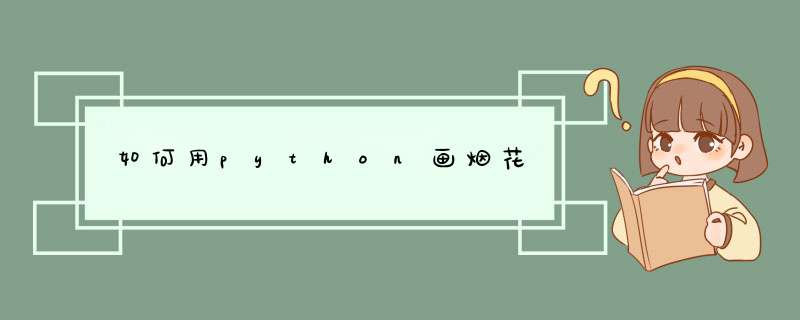
用python画烟花的方法:首先创建一个所有粒子同时扩大的二维列表;然后实现粒子范围扩大,以自由落体坠落;接着移除超过最高时长的粒子;最后循环调用保持不停。
用python画烟花的方法:
# -*- Coding: utf-8 -*-# Nolaimport tkinter as tkfrom PIL import Image, ImageTkfrom time import time, sleepfrom random import choice, uniform, randintfrom math import sin, cos, radians# 模拟重力GraviTY = 0.05# 颜色选项(随机或者按顺序)colors = ['red', 'blue', 'yellow', 'white', 'green', 'orange', 'purple', 'seagreen', 'indigo', 'cornflowerblue']'''particles 类粒子在空中随机生成随机,变成一个圈、下坠、消失属性: - ID: 粒子的ID - x, y: 粒子的坐标 - vx, vy: 在坐标的变化速度 - total: 总数 - age: 粒子存在的时长 - color: 颜色 - cv: 画布 - lifespan: 最高存在时长'''class Particle: def __init__(self, cv, IDx, total, explosion_speed, x=0., y=0., vx=0., vy=0., size=2., color='red', lifespan=2, **kwargs): self.ID = IDx self.x = x self.y = y self.initial_speed = explosion_speed self.vx = vx self.vy = vy self.total = total self.age = 0 self.color = color self.cv = cv self.cID = self.cv.create_oval( x - size, y - size, x + size, y + size, fill=self.color) self.lifespan = lifespan def update(self, dt): self.age += dt # 粒子范围扩大 if self.alive() and self.expand(): move_x = cos(radians(self.ID * 360 / self.total)) * self.initial_speed move_y = sin(radians(self.ID * 360 / self.total)) * self.initial_speed self.cv.move(self.cID, move_x, move_y) self.vx = move_x / (float(dt) * 1000) # 以自由落体坠落 elif self.alive(): move_x = cos(radians(self.ID * 360 / self.total)) # we technically don't need to update x, y because move will do the job self.cv.move(self.cID, self.vx + move_x, self.vy + GraviTY * dt) self.vy += GraviTY * dt # 移除超过最高时长的粒子 elif self.cID is not None: cv.delete(self.cID) self.cID = None # 扩大的时间 def expand (self): return self.age <= 1.2 # 粒子是否在最高存在时长内 def alive(self): return self.age <= self.lifespan'''循环调用保持不停'''def simulate(cv): t = time() explode_points = [] wait_time = randint(10, 100) numb_explode = randint(6, 10) # 创建一个所有粒子同时扩大的二维列表 for point in range(numb_explode): objects = [] x_cordi = randint(50, 550) y_cordi = randint(50, 150) speed = uniform(0.5, 1.5) size = uniform(1, 3) color = choice(colors) explosion_speed = uniform(0.2, 1) total_particles = randint(10, 50) for i in range(1, total_particles): r = Particle(cv, IDx=i, total=total_particles, explosion_speed=explosion_speed, x=x_cordi, y=y_cordi, vx=speed, vy=speed, color=color, size=size, lifespan=uniform(0.6, 1.75)) objects.append(r) explode_points.append(objects) total_time = .0 # 1.8s内一直扩大 while total_time < 1.8: sleep(0.01) tnew = time() t, dt = tnew, tnew - t for point in explode_points: for item in point: item.update(dt) cv.update() total_time += dt # 循环调用 root.after(wait_time, simulate, cv)def close(*ignore): """退出程序、关闭窗口""" global root root.quit()if __name__ == '__main__': root = tk.Tk() cv = tk.Canvas(root, height=400, wIDth=600) # 绘制一个黑色背景 cv.create_rectangle(0, 0, 600, 400, fill='black') # cv = tk.Canvas(root, height=400, wIDth=600) # # 选一个好看的背景会让效果更惊艳! # image = Image.open("./image.jpg") # photo = ImageTk.PhotoImage(image) # # cv.create_image(0, 0, image=photo, anchor='nw') cv.pack() root.protocol("WM_DELETE_WINDOW", close) root.after(100, simulate, cv) root.mainloop()实现效果图:
总结相关免费学习推荐:python视频教程
以上是内存溢出为你收集整理的如何用python画烟花全部内容,希望文章能够帮你解决如何用python画烟花所遇到的程序开发问题。
如果觉得内存溢出网站内容还不错,欢迎将内存溢出网站推荐给程序员好友。
欢迎分享,转载请注明来源:内存溢出

 微信扫一扫
微信扫一扫
 支付宝扫一扫
支付宝扫一扫
评论列表(0条)